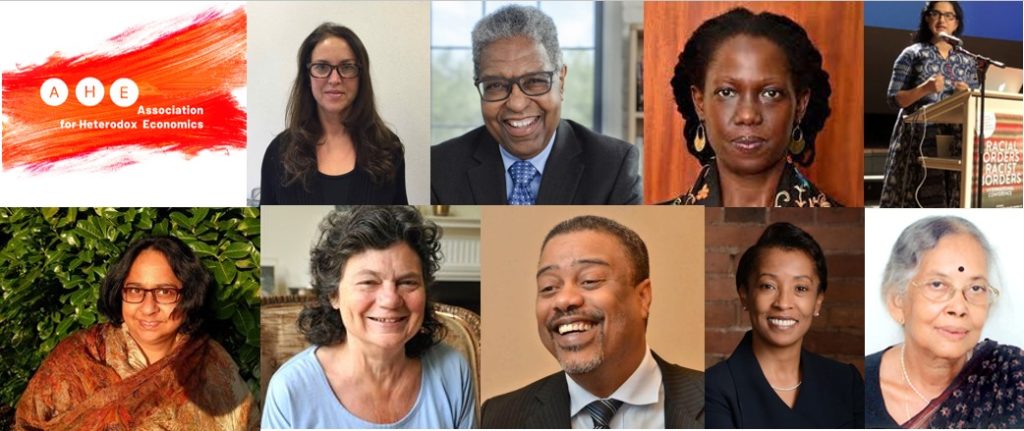Structural Inequalities Uncovered: the
Contributions of Heterodox Economics in
Tackling Racial and Gender Inequality
July 2nd – July 30th, 2021
Keynote Speakers
Professor William (“Sandy”) Darity Jr.
Professor Susan ‘Sue’ Himmelweit
Elias Sampaio

******* HERE YOU WILL FIND THE INSTRUCTIONS ON HOW TO JOIN THE PRESENTATION SESSIONS ********
Friday 2nd July
2pm-3.30pm (BST):
Opening Plenary: Covid-19, gender inequalities and heterodox economics
Elissa Braunstein (Colorado State University, US): Stratification and Social Reproduction in a Post-Pandemic World: A Feminist Macro Perspective
Sue Himmelweit (Open University, UK): Gender equality requires a caring economy: first step a care-led recovery
Lyn Ossome (Institute for Economic Justice, South Africa): Rethinking economies of care in the wake of Covid-19 in Africa
https://youtu.be/RA2hwdMOw1k
3:30pm-4pm (BST)
Break
4pm-5.30pm (BST)
Parallel Sessions
YSI Session 1: Inequalities Working Group
(Breakout Room 1)
Jheelum Sarkar (Jawaharlal Nehru University): Climate change and gender inequality
Caterina Manicardi (University of Pisa): Organising social reproduction and welfare provision: the case of Italy
Pablo Amsler (Universidad Nacional del Litoral): Class positioning and social structures in post-convertibility Argentina (2006-2015)
João Pedro Braga (University of the Witwatersrand): Finance for emergency relief: A comparative study of Brazilian and South African social policy responses to the Covid-19 crisis
Senior discussant: Luiza Nassif-Pires (Levy Institute)
https://www.youtube.com/watch?v=EUbHby6LQNM
Networking Session* 1: Dimensions of Inequalities
(Breakout Room 2)
Thereza Ballister (SOAS, University of London): The Effects of Financial Inclusion on Poverty and Income Inequality: a simultaneous equation model analysis
Deborah Noguera (Universidad Nacional de La Plata): The causes of inequality. A comparative study of capital, labour and property dynamics between central and peripheral countries
Julie Litchfeld (University of Sussex), Elodie Douarin (UCL) and Fatlinda Gashi (UCL): Angry men and Civic women? Gendered effects of conflict on political participation
Ana Paula Guidolin (State University of Campinas – Unicamp) and Ana Luíza Matos de Oliveira (FLACSO, Brazil): Feminist Contributions to the critique of economics: analyses from Mexico and Brazil
Avinash Kumar (Jawaharlal Nehru University): Social Identity and Inter-generational Mobility in India
You can access the material for the session here.
Networking Session* 2: Explanations of Economics
(Breakout Room 3)
Robin Latimer (Independent Researcher): Covid and the money system
Sophia Kuehnlenz (Manchester Metropolitan University): Economics’ envy: Physicists’ attempt to explain economic crises
Santiago Luzuriaga (University of Buenos Aires and University of Valencia)
You can access the material for the session here.
*Networking sessions contain pre-recorded material (presentations and papers). Participants are asked to access them and read/watch them before attending the session. The content of these will be discussed but they will not be presented again during the session.
Friday 9th July
2pm-3.30pm (BST)
Parallel Sessions
Special Panel: Existence or Extinction? A Conversation on Salves for the Crises of our Times
(Breakout Room 1)
Ravi Batra (Southern Methodist University): The Legacy of PC Sarkar: A Cyclical Paradigm of Societal Change
Roslyn Fuller (Solonian Democracy Institute): Deliberative Democracy and Sortition: Against Oligarchy
Fadhel Kaboub (Denison University – Ohio, US): The Case for Colonial and Climate Reparations
Genevieve Vaughn (International Feminists for a Gift Economy):The Matricentric Gift Economy
Rajani Kanth (Session Chair, World Peace Congress): The Provenance of the Episteme(s) of Late Modernist Self-Cannibalism
Presentation Session 1: Economics in Practice
(Breakout Room 2)
Claudia Fontanari (Università degli Studi di Roma Tre): The updated Okun method for estimation of potential output with broad measures of labour underutilization: an empirical analysis
Dirk Ehnts (TU Chemnitz) and Michael Paetz (University of Hamburg): COVID‐19 and its economic consequences for the Euro Area
Carlos Guerrero-de-Lizardi (Universidad Nacional Autónoma de México): On the precedence of constraints on economic growth: advocating the ecological footprint perspective
Thoralf Dassler (Westminster Business School): Derek Theoretical Disconnects Within the Resource-Based Theory: A discussion in support of obtaining confidence in measures and empirical findings
3:30pm-4pm (BST)
Break
4pm-5.30pm (BST)
Parallel Sessions
The Future of Economics Teaching Panel 1: Economics After Covid
(Breakout Room 1)
Mike Reynolds (University of Leeds)
Jo Michell (UWE Bristol)
Michelle Groenewald (Northwest-University, South Africa)
Presentation Session 2: Philosophical Approaches in Contemporary Issues
(Breakout Room 2)
Mu-Jeong Kho (UCL): Veblen and the Radical Turn: Can the Crisis “Covid 19 Pandemic” Truly Act as Trigger for Self-Organising a New Resilient System of Gender?
Valentina Erasmo (Università degli Studi G. d’Annunzio): Extending Capabilities Conception of Individual in Economics: Relationality and Responsibility
Imko Meyenburg (Anglia Ruskin University): Brexit means Brexit: Epistemic modality and the ontology of political discourse
Monika Meireles (Instituto de Investigaciones Económicas, UNAM): Roots of Financial Instability in the Post-Keynesian Institutionalist Approach: what does indebtedness mean in the pandemic?
Friday 16th July
2pm-3.30pm (BST):
Special Plenary: Colonialism and the Role of Economics
S. Charusheela (University of Washington, US): “Colonial Traces in Heterodox Economics: Gender, Nation, State”
Elias Sampaio (Federal University of Bahia, Brazil): “Racial Inequalities as Pillars of Brazil’s Underdevelopment”
Sunanda Sen (Jawaharlal Nehru University New Delhi, India): “On Colonial mode of subordination for economies”
https://youtu.be/bmZKU1BTcFM
3:30pm-4pm (BST)
Break
4pm-5.30pm (BST)
Parallel Sessions
The Future of Economics Teaching Panel 2: Economics and Climate Change
(Breakout Room 1)
Molly Scott Cato (Green Party, UK)
Marco Veronese Passarella (University of Leeds)
Elke Pirgmaier (University of Lausanne)
Presentation Session 3: Decoloniality in Economics
(Breakout Room 2)
Ingrid Kvangraven (University of York): Dependency Theory and Racial Inequalities: A Call for Renewed Engagement
Roberto Veneziani (Queen Mary University of London): The Dynamics of International Exploitation
Marie Dyveke Styve (European University Institute): The White Supremacy of Mining Finance
Leandro Bona (Universidad Nacional de La Plata) Pluralism, socioeconomics and de-coloniality
Friday 23rd July
2pm-3.30pm (BST)
Parallel Sessions
Ethics and Economics Panel 1
(Breakout Room 1)
María Isabel Encinar (Universidad Autónoma de Madrid) and Félix-Fernando Muñoz (Universidad Autónoma de Madrid): Revisiting the analytical relationship of Ethics and Economics
Giancarlo Ianulardo (University of Exeter) and Aldo Stella (University of Perugia): Ethical reductionism and the neglect of the moral imagination in economics and economic education
Stefano Solari (University of Padova): Keeping alive non-individualistic ethics in political economy: a review of concepts from Aquinas to Habermas
Craig Duckworth (London South Bank University), Imko Meyenburg (Anglia Ruskin University) and Ioana Negru (University of Sibiu): Utilitarianism and Deliberation in Economics
https://www.youtube.com/watch?v=zLOv7Lv3Dd8
Presentation Session 4: Global Perspectives of Neoliberalism
(Breakout Room 2)
Pedro Sampaio (UFRGS): Brazil’s economic downturn in Marxian categories, 2010-2015: from the Pink Tide to the Conservative Wave
Minu Jain: The “Chicago Boys” of India: Unpacking the Role of Neoliberal Economists in the making of Authoritarian India
Renan Araujo (UNICAMP) and Julia Bustamante (UNICAMP): The Relationship between Neoliberalism and Financialization: The Brazilian Case
Sam Sadian (University of South Africa): A consumer route to the economic polity? Wolfgang Streeck on consumption, post-democracy and neoliberal capitalism
3:30pm-4pm (BST)
Break
4pm-5.30pm (BST)
Parallel Sessions
The Future of Economics Teaching Panel 3: Where to for Economics Education?
(Breakout Room 1)
Alvin Birdi (University of Bristol)
Danielle Guizzo (University of Bristol)
Stefania Paredes-Fuentes (University of Warwick)
Presentation Session 5: Beyond the Individual: Agency and Capabilities in Economic Theory
(Breakout Room 2)
Elaine Agyemang Tontoh (The New School): Theorizing Motherhood within the Capabilities Approach and Marxist Feminist Social Reproduction Theory
Sheba Tejani (The New School) and Sakiko Fukuda-Parr (The New School): Gender and Covid-19: Workers in global value chains
Gabriella Corrêa Tavares (UFRJ), Isabella Miranda Meyer (UFRJ) and Marília Bassetti Marcato (UFRJ): Androcentric Bias of Neoclassical Paradigm and the Omission of the Female Economic Agent
Andreas Lichtenberger (The New School): Income as a matter of geography, sex, and race
5pm-5.45pm (BST)
Break
Friday 30th July
2pm-3.30pm (BST):
Closing Plenary: Tackling Racial Inequality – Heterodox Solutions
Gargi Bhattacharyya (University of East London, UK): “Economics without violence? Racial justice and collective survival”
Rhonda Sharpe (WISER, US): “At the Intersection of My Identities: The Complexity of Good Policy”
William (“Sandy”) Darity Jr. (Duke University, US): “Reparations and Racial Justice”
https://youtu.be/HOhwfb6zNwg
3:30pm-4pm (BST)
Break
4pm-5.30pm (BST)
Parallel Sessions
YSI Session 2: Economic Development Working Group*
(Breakout Room 1)
*Please note this session will finish at 6pm
Harshita Bhasin (South Asian University): Socio-economic differentiation makes way for solidarity: The case of agrarian unrest in the Indian Punjab
Diana A. Prelorenzo (IHEAL – Paris 3): Changing World of Labour and Work in the tourism industry: empirical evidence from municipality of Cancun, Mexico
Bhavya Sinha (Colorado State University)
Chigozie Nelson Nkalu (University of Aberdeen): A Panel Investigation of Kaldor’s First Growth Law: Evidence from Sub-Saharan African Countries
Senior discussant: Deepankar Basu (UMass Amherst)
Ethics and Economics Panel 2
(Breakout Room 2)
Paolo Ramazzotti (University of Macerata): Racism, the economy and ethics: where does it all begin?
Ferda Dönmez Atbasi (Ankara University) and Irene Sotiropoulou (University of Hull): Ethics and grassroots economics – A quest for collective meaning
Ioana Negru (University of Sibiu) and Don Webber (University of Sheffield): Women’s publication strategies and academic career paths: Do institutions matter?
https://youtu.be/qQ0S5bCc3xs
